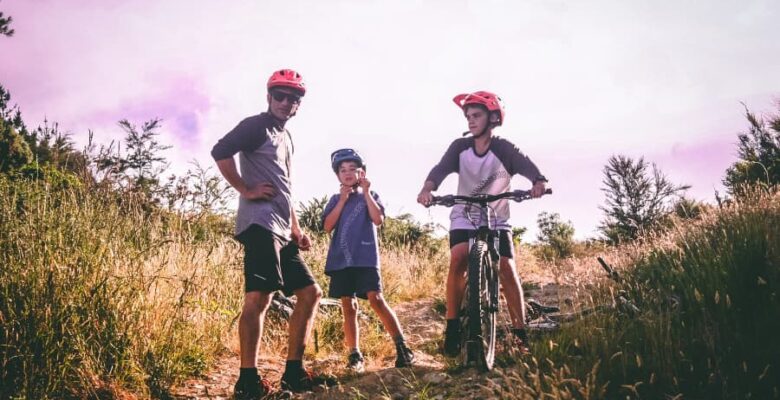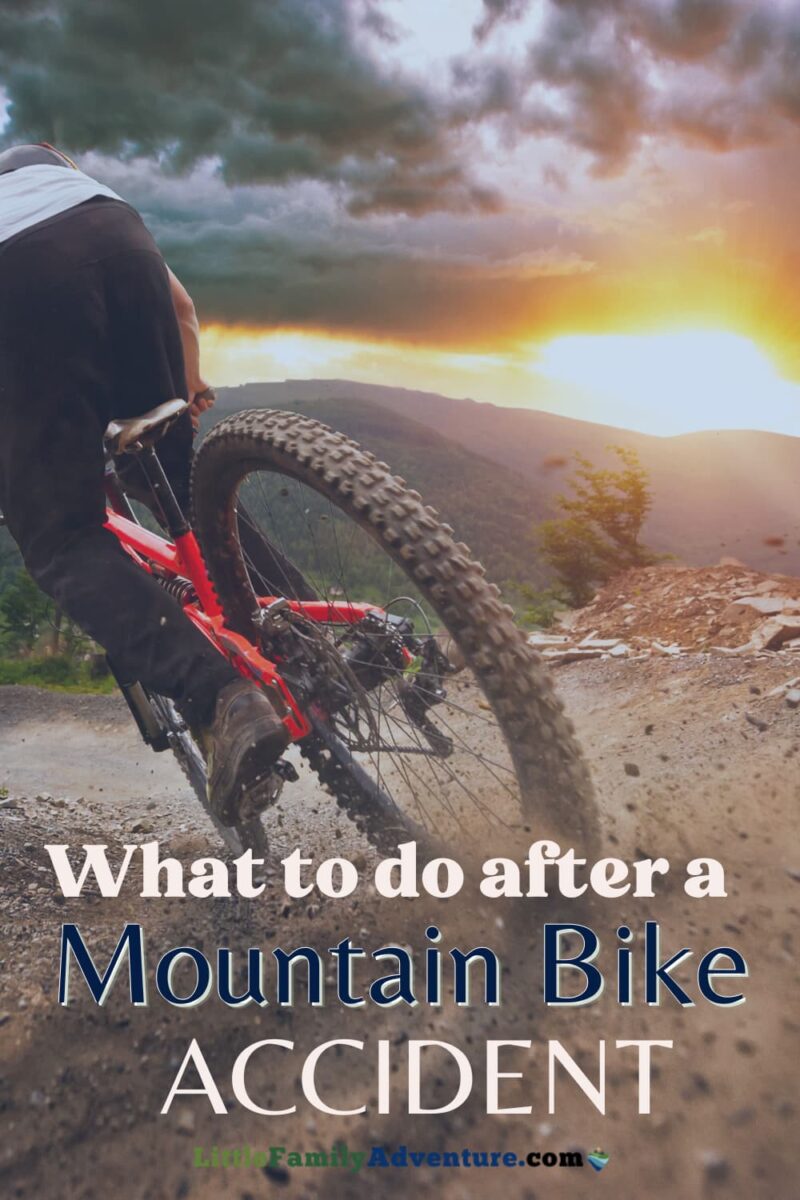Mountain biking is an adventuresome sport, but one cannot deny that it may put you in imminent peril at times, caused mainly by road accidents. Your skill levels, ability, and years of experience biking on trails can sometimes be disregarded, as several variables can lead to mountain bike accidents. For instance, bad trail conditions, sudden health issues, mechanical failure, extreme weather, or just an unexpected collision with another vehicle can result in a wreck.
What to Do After a Bike Accident?
Here’s what we believe every biker should do after a mountain bicycle crash.
This article contains affiliate links. We earn from qualifying purchases.
1. Pause
Get yourself together. Get up, move over the side of the trails, and take five. Normalize your breathing temperament, and drink some water to calm yourself down. Observe yourself, and try to identify if you feel safe mentally and physically. If you are feeling tense, call an ambulance. Check your surroundings; if you notice any other casualties on the road, check on their safety.
There may be other trail users around you; seek help if you must.
2. Check for Injuries
The second most important thing you should do after catching your breath is check for injuries. From paddling at a certain speed to crashing, falling over, and any possible collision that may have caused you to get hurt somewhere in your body. It takes time to feel the pain if you’re hurt. So don’t be quick to jump to conclusions and resume riding without assessing the damages fully.
This is precisely why point number one is important. Your adrenaline is expected to hit the roof after an accident, but it’s vital to slow down and take a pause to start feeling normal again. To assess the accident’s severity, you must clear your head. Try to stand up and feel your muscles. Look out for any discomfort. It’s best to call someone right away after an accident to keep them informed.
After successfully assessing yourself, you can decide whether you want to walk home or get help. It’s advised not to get back on the pedals right after an accident unless it’s mild and you’re confident to continue your riding journey.

3. Clear the Trail
The third recovery tip is to clear the trail. Once you know you’re okay and safe, you must make an effort to clear the trail for other trail users. Your crashed bike, helmet, bike gears, bags, or even debris must be removed from the trails that are lying around from your crash. There’s a high chance that the next biker will get into a dangerous accident due to unexpected obstacles.
This is more common than you can anticipate. One crashed bicycle can become a domino effect, causing severe injuries only because the first bike accident’s residues were left behind on the trails.
Move over to the side at first. Make sure you are visible to others approaching. You should also ensure that you do not become an obstacle for them. Otherwise, you’re in for a second accident with more severe consequences.
Tip: Check for any hazardous changes on the trail caused by your crash, like rocks, debris, and branches sticking out, as they are all potential hazards for other riders.
4. Check Your Bike Thoroughly
Once you return home, you should go over your bike thoroughly. If you own a work stand to elevate it, it’s a good idea to use it. Get your headlight or flashlight out to take a closer look at your bike in detail. Bends, cracks, and dents are what you’re going to try to spot initially. You also have to pay attention to scratches too.
If you aren’t sure or confident about rectifying it, you can take it to your nearest bike shop for a quick inspection and tune it up if required. Professional hands will reassure you that your bike is good to go for your next adventures.
If you notice any irreparable damage on your bike, you should look into purchasing a new bike so you can start riding again, and continue your biking expeditions.
5. Give Yourself Time To Heal
Many casualties forget to allow themselves time to heal. Even with minor physical injuries and wounds, post-accident traumas are common. So, give yourself time to heal. Seek medical attention if you’ve been involved in a mountain bike accident.
You won’t identify many repercussions, but your doctor will after running medical tests such as x-rays. It’s essential to rest before getting back on the trails again. If you neglect it, you may suffer from long-term health problems. But you can prevent it by addressing it with your doctor immediately.
Even with minor physical injuries from a mountain bike accident, it’s essential to monitor for deeper issues such as spinal discomfort. Consulting specialists in spine procedures can significantly enhance recovery effectiveness by identifying and treating, any underlying spine conditions early.
6. Insurance Is a Must
Mountain bike accidents cannot be prevented at all times. As mentioned above, many variables cause road accidents. Sometimes, advanced mountain bikers face crashes, even with top-notch technical skills. For those who identify as beginner mountain bikers, taking preventive measures can prevent you from getting into accidents.
Assessing your health conditions and trail difficulty levels before mountain biking is prudent. Additionally, one should also have their health insured – this applies to everyone, not just mountain bikers. Many hikers also get into road accidents caused by other fellow trail users. So, if you know that this trail location also attracts hikers, and families with kids to enjoy outdoor activities, ride consciously.
For mountain bikers, you should also look into bicycle insurance policies to give you the peace of mind of knowing that if, unfortunately, you ever get into a bike crash, you’re not alone! Your health and bike insurance will provide you with the support required in such times, both financially and legally!
Conclusion
If you’re reading this blog, you probably got into a crash. And this is a good sign that you are taking the right measures to find out what needs to be done during and after getting into a mountain bike accident.
Remember, we know it’s scary, but it doesn’t have to put an end to your mountain biking habits. Being well-informed about tackling such accidents will enable you to ride safely in the future and nail your next attempt. Before you go, remember that you should always be honest about your riding abilities and trail conditions and have preventive measures at the top of your mind. We hope you ace your next venture!
Can’t read now? Pin for later!

FOLLOW US ON SOCIAL MEDIA
- Facebook Page
- Family Adventures Facebook Group
- Easy Camp Cooking Facebook Group
Don’t forget to invite your friends to our Facebook groups! We would also love to see your vacation pictures!
For more outdoor activity inspiration, check out our latest posts here:



This article is super useful! Mountain biking sounds thrilling but those risks are eye-opening. I once had a minor spill and was so shaken I didn’t check for injuries right away. Now I’ll be more careful. What if you can’t move after an accident? How long should you wait before trying to get help if you’re alone?